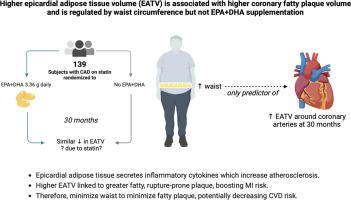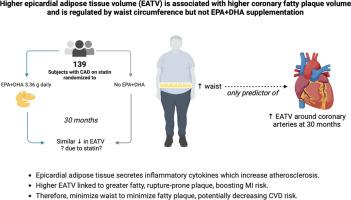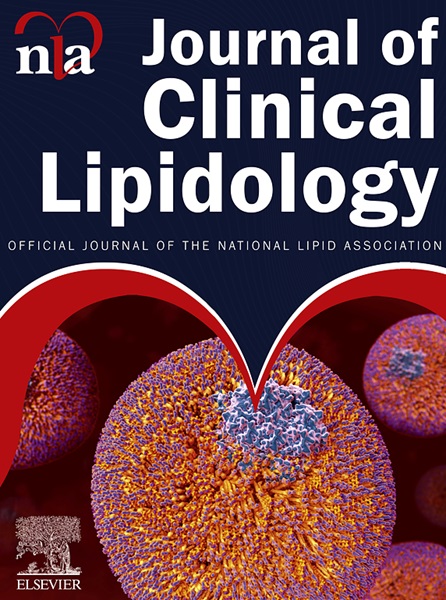Higher epicardial adipose tissue volume is associated with higher coronary fatty plaque volume and is regulated by waist circumference but not EPA+DHA supplementation
IF 3.6
3区 医学
Q2 PHARMACOLOGY & PHARMACY
引用次数: 0
Abstract
BACKGROUND
Eicosapentaenoic acid (EPA) and docosahexaenoic acid (DHA) supplementation lower triglyceride levels. The impact on epicardial adipose tissue volume (EATV), which is associated with cardiovascular events, is unclear.
OBJECTIVE
To determine if triglyceride reduction with EPA+DHA supplementation decreases EATV and whether EATV affects coronary plaque.
METHODS
139 subjects with coronary artery disease (CAD) on statins were randomized to 3.36 g EPA+DHA daily or none (control) for 30 months. EATV, coronary plaque volumes and coronary artery calcium score were measured with coronary computed tomographic angiography.
RESULTS
Change in triglyceride level correlated with change in EATV (r=0.236; p=0.006). Despite a 6.7% triglyceride reduction (p=0.021) with EPA+DHA supplementation compared to no change in control (between group p=0.034); both groups had similar reductions in EATV possibly due to statin treatment. EATV above the median (>115.6 cm3) was the only determinant of baseline coronary fatty plaque volume (β=2.4, p=0.010). After multivariate adjustment, waist circumference, a surrogate of abdominal visceral adiposity, was the only determinant of baseline EATV (odds ratio {OR]:1.093; 95% confidence interval [CI]:1.003-1.192, p=0.042). Moreover, increase in waist circumference was the only predictor of an increase in EATV at 30 months (β=0.320, p=0.018).
CONCLUSIONS
EATV is associated with higher coronary fatty plaque volume and is regulated by waist circumference but not EPA+DHA supplementation at 30-month follow-up in CAD patients on statin treatment. The direct correlation between waist circumference and EATV suggests that maintaining a healthy weight may limit EATV and coronary fatty plaque volume, potentially leading to a decrease in cardiovascular events.


较高的心外膜脂肪组织体积与较高的冠状动脉脂肪斑块体积相关,并受腰围而非 EPA+DHA 补充剂的调节
补充二十碳五烯酸(EPA)和二十二碳六烯酸(DHA)可降低甘油三酯水平。对心外膜脂肪组织体积(EATV)的影响尚不清楚,而心外膜脂肪组织体积与心血管事件有关。为了确定补充 EPA+DHA 是否会降低甘油三酯,以及 EATV 是否会影响冠状动脉斑块。139 名服用他汀类药物的冠心病患者被随机分配到每天服用 3.36 克 EPA+DHA 或不服用(对照组),为期 30 个月。冠状动脉计算机断层扫描血管造影术测量了EATV、冠状动脉斑块体积和冠状动脉钙化评分。甘油三酯水平的变化与 EATV 的变化相关(=0.47;=0.01)。尽管补充 EPA+DHA 后甘油三酯降低了 6.7%(=0.021),而对照组没有变化(组间=0.034);但可能由于他汀类药物的治疗,两组的 EATV 降低幅度相似。EATV高于中位数(>115.6厘米)是基线冠状动脉脂肪斑块体积的唯一决定因素(β=2.4,=0.010)。经多变量调整后,腰围(腹部内脏脂肪含量的代用指标)是基线 EATV 的唯一决定因素(OR:1.093;95% CI:1.003-1.192,=0.042)。此外,腰围的增加是 30 个月后 EATV 增加的唯一预测因素(β=0.320,=0.018)。在对接受他汀类药物治疗的 CAD 患者进行 30 个月的随访时,EATV 与较高的冠状动脉脂肪斑块体积有关,并受腰围而非 EPA+DHA 补充剂的调节。腰围与EATV之间的直接相关性表明,保持健康的体重可限制EATV和冠状动脉脂肪斑块的体积,从而减少心血管事件的发生。
本文章由计算机程序翻译,如有差异,请以英文原文为准。
求助全文
约1分钟内获得全文
求助全文
来源期刊
CiteScore
7.00
自引率
6.80%
发文量
209
审稿时长
49 days
期刊介绍:
Because the scope of clinical lipidology is broad, the topics addressed by the Journal are equally diverse. Typical articles explore lipidology as it is practiced in the treatment setting, recent developments in pharmacological research, reports of treatment and trials, case studies, the impact of lifestyle modification, and similar academic material of interest to the practitioner.
Sections of Journal of clinical lipidology will address pioneering studies and the clinicians who conduct them, case studies, ethical standards and conduct, professional guidance such as ATP and NCEP, editorial commentary, letters from readers, National Lipid Association (NLA) news and upcoming event information, as well as abstracts from the NLA annual scientific sessions and the scientific forums held by its chapters, when appropriate.

 求助内容:
求助内容: 应助结果提醒方式:
应助结果提醒方式:


